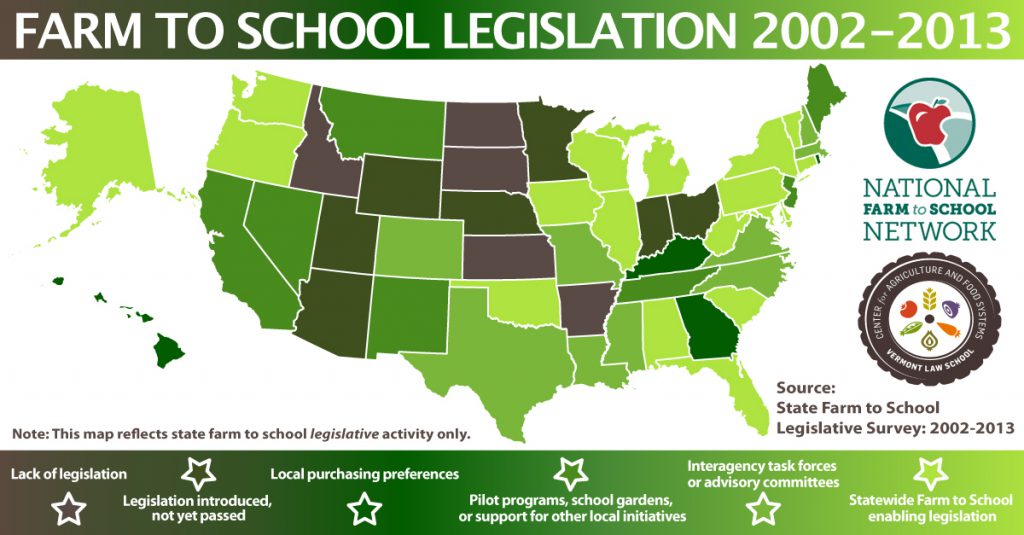
by Chelsey Simpson, communications manager for the National Farm to School Network
Tomorrow marks the beginning of National Farm to School Month. For the next 31 days, schools across the country will celebrate the local products in their lunch offerings, the gardens in their schoolyards, and the food and agriculture education offered in their classrooms. Some will engage with the farm-to-school concept for the first time; others will enjoy the harvest (literal and figurative) from years of farm-to-school success.
At the National Farm to School Network, we consider Farm to School Month itself to be the product of a successful harvest. Our organization was founded in 2007 to connect and strengthen the many facets of the farm-to-school movement, and advocating for the creation of Farm to School Month was one of our first national campaigns. The passage of House Resolution 1655 in 2010 made the annual celebration a reality, demonstrating the growing value of farm-to-school programs as a means to improve child nutrition, support local economies, and educate children about the origins of food.
But we didn’t stop there. We also successfully advocated for the creation of the first-ever USDA Farm to School Census and for mandatory funding for farm-to-school grants through the Healthy Hunger-Free Kids Act. We’ve supported the creation of state-level farm-to-school policy, as well. But there’s more to be done, and we need the support of local food advocates, child health advocates, and anyone else who believes in farm-to-school’s potential to transform lives and communities.
Here are the top four things you can do to support farm-to-school policies:
1. Make sure your state is on the map. Thirty-eight states and the District of Columbia have legislation supporting farm-to-school—is your state on the list? Check out our map and download the full report to learn what some states are doing to support children and local food producers. If your state isn’t on the list, write to your elected officials and share the report with them; ask how you can help your state become a farm-to-school leader.

2. Protect your farmers. Food safety is critical, but the current draft of the Food Safety Modernization Act (FSMA) contains rules that could make it very hard for sustainable farmers and other small producers to stay in business. Without farmers, there can be no farm-to-school. The Food and Drug Adminisration is actively seeking comments on the proposed act, so visit the National Sustainable Agriculture Coalition’s action page to learn how to make your voice heard.
3. Celebrate Farm to School Month. This fact sheet contains lots of ideas for getting involved, but, better yet, you can use this October to petition your state or local government to officially recognize Farm to School Month with a proclamation or declaration. You can find sample documents for these on our website or in our state policy report.
4. Stay informed. In the coming months, the National Farm to School Network will be launching a national advocacy campaign related to the reauthorization of the Child Nutrition Act, a special piece of legislation that only comes up for a vote every five years. We’ll be asking Congress to include more funding for the U.S. Department of Agriculture’s (USDA’s) Farm to School Grant Program. Currently, there are five times more grant requests than there are funds available. Sign up for our free email newsletter to stay informed about farm-to-school policy and to receive action alerts.
The farm-to-school movement has already seen great success. Help sow the seeds for our next big harvest!
 Chelsey Simpson is the communications manager for the National Farm to School Network. The National Farm to School Network is an information, advocacy, and networking hub for communities working to bring local food sourcing and local food and agriculture education into school systems and preschools.
Chelsey Simpson is the communications manager for the National Farm to School Network. The National Farm to School Network is an information, advocacy, and networking hub for communities working to bring local food sourcing and local food and agriculture education into school systems and preschools.




No comments yet.